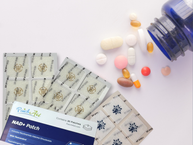Have you been feeling tired lately, or had trouble concentrating or feeling peppy? It could be a deficiency of vitamin B12.* This B vitamin is essential for energy production in the body, and low levels can leave you feeling tired. The Vitamin B12 Energy Plus Vitamin Patch by PatchAid is a source of vitamin B12, as well as other B vitamins, that are essential for normal energy production.*
Here’s what you should know about the roles of vitamin B12 in energy production, and how a vitamin patch may help.* Be sure to ask your healthcare provider before using any nutritional supplements.
Vitamin B12 and Energy Production
Energy production in the body can refer to converting energy that’s stored in the food you eat into energy that your body can use. You need energy not only for exercising and moving, but for every process in your body, such as your heart pumping blood, your lungs breathing air, and your brain thinking.
Vitamin B12 and other B vitamins are involved in producing usable energy in your body. These vitamins include vitamin B1, or thiamin, vitamin B2, or riboflavin, vitamin B3, or niacin, vitamin B5, vitamin B6, and folic acid, or vitamin B9. They each have specific roles in converting carbohydrates, protein, and fat into usable forms of energy.
When you eat food that has carbohydrates, protein, or fat, your body absorbs those nutrients. They are broken down into smaller components. Carbohydrates, for example, are the major source of energy, and they’re broken into glucose. Then, in a multi-step process, your body can generate usable energy.
Vitamin B12 has additional roles in the body, including the following.
- Supports heart health by reducing levels of homocysteine.*
- Helps maintain a normal mood.*
- Helps produce normal red blood cells and prevent megaloblastic anemia.*
Energy Production and Signs of Vitamin B12 Deficiency
Because of vitamin B12’s roles in energy production, vitamin B12 deficiency can lead to low energy in the body. If you’re deficient, you may feel tired and weak. Since healthy red blood cell counts may be lower, you may have less oxygen delivered to your cells, which can make you feel shortness of breath, especially if you try to exert yourself while exercising. Other signs may include peripheral neuropathy and a disturbed mood.
Sources of Vitamin B12
These are some sources of vitamin B12.
- Eggs
- Red meat
- Chicken
- Liver and other organ meats
- Fish and shellfish
- Milk
- Many fortified breakfast cereals
- Many fortified dairy-free milk substitutes
- Fortified nutritional yeast
Other B vitamins are in a range of foods. Folic acid, for example, is in leafy green vegetables and orange juice. Nuts, beans, fruits and vegetables, meat, and grains contain various B vitamins. Many fortified breakfast cereals include all of the B vitamins. The recommended daily amount of B12 for most people is about 2.4 mcg.
Vitamin B12 Deficiency Risk Factors and Assessment
As you can see from the food sources of vitamin B12, animal-based foods are the only natural sources of vitamin B12. That’s why people who follow plant-based, or vegan, diets are at risk for vitamin B12 deficiency.
Older adults are commonly deficient as well. That’s because absorption may be decreased due to decreased production of acid in the stomach. Bariatric surgery patients and other groups with malabsorptive disorders can be deficient in vitamin B12, too.
It’s easier to test vitamin B12 levels than some other nutrients. Your doctor can order blood tests for vitamin B12 levels. Other tests that can indicate a deficiency of vitamin B12 or folic acid are blood tests related to red blood cells. These are all common tests that you can probably do at a local clinic or lab, and you don’t have to fast beforehand.
Vitamin B12 Supplements and the Vitamin B12 Energy Plus Patch
If you’re low in B12 or you have risk factors for deficiency, taking supplements can help your levels stay up.* The Energy Plus Vitamin B12 Patch by PatchAid has 1,200 mcg of vitamin B12, and it also has the other B vitamins.
It includes a proprietary blend with ingredients such as ginseng, choline, rhodiola rosea, and inositol.
The patch:
- May support healthy energy metabolism.*
- May promote a better mood.*
- May support heart, blood, and brain health.*
- May support healthy hair, nails, and skin.*
- May support breast and colon health.*
Unlike many energy supplements, it doesn’t have sugar or any risk of a sugar crash. There’s also no caffeine in the patch. It’s free from gluten and lactose, and it’s hypoallergenic. It doesn’t contain latex.
So how can you support energy with a patch? It’s easy to use the Vitamin B12 Energy Plus Patch.
- Select an area of skin. The vitamin B12 patch will stick better if you choose an area of skin without hair, lotion, or oil residues such as your shoulder, back, or hip. Clean and dry the skin.
- Remove the vitamin patch from the release liner.
- Adhere the vitamin patch to your skin, pressing firmly.
- For best results, it is recommended to wear PatchAid vitamin patches for 8 hours. There is no additional benefit of wearing the B12 patch longer than 8 hours.
- When finished, remove the vitamin B12 patch, fold it in half, and discard.
- Repeat with a new vitamin patch the next day.
Vitamin B12 and other B vitamins are essential for normal energy production and metabolism, so it’s important to have normal levels of all of them.* While oral supplements may be hard to absorb or may not have high enough quantities of these nutrients, and vitamin B12 sublingual tablets or injections can be lacking in other nutrients, the Vitamin B12 Energy Plus Patch by PatchAid has vitamin B12, other B vitamins, and a proprietary formula with other compounds. Ask your healthcare provider if it might be right for you and before using any dietary or nutritional supplements.
*The Food and Drug Administration has not evaluated these statements. PatchAid patches are not intended to diagnose, treat, cure or prevent any disease. Anyone with a medical condition should seek the advice of a licensed medical practitioner. Individual results may vary.







